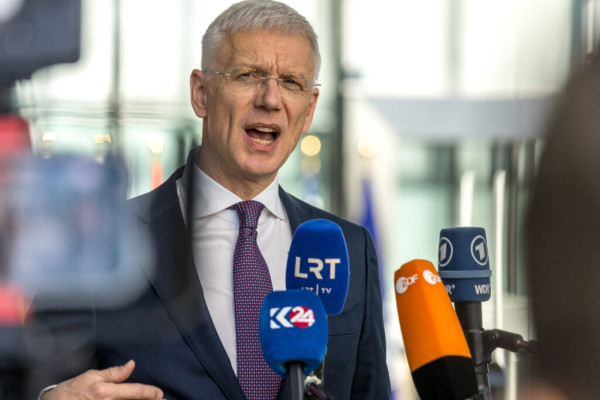How dirty Russian money taught Latvia to get serious on sanctions
RIGA — When your most important ally swoops in and closes your third-largest bank while calling it a “money laundering institution,” it’s time to roll up your sleeves and get to work.
That’s exactly what Latvia did when confronted by the U.S. Treasury Department in 2018: It cleaned up its banking sector and passed strict anti-money laundering laws. If that American slap on the wrist hadn’t arrived six years ago, Latvia “would have been in a much more difficult position to enforce sanctions after Russia’s invasion of Ukraine,” Paulis Iļjenkovs, the country’s top financial investigator, told POLITICO.
In an approach that is unique within the European Union, Latvia has now designated the Financial Intelligence Unit (FIU) that Iļjenkovs runs as the single central authority for applying and enforcing sanctions imposed by the EU in response to Vladimir Putin’s war on Ukraine.
Across the bloc, meanwhile, these tasks are spread among some 160 national agencies. The fragmented approach reflects the fact that while the EU has jointly agreed on 13 rounds of Russia sanctions — with a 14th in the works — its 27 member countries are individually responsible for putting them into practice.
“Latvia is, in a positive way, a perfect storm,” explains Tom Keatinge, director of the Centre for Financial Crime and Security Studies at RUSI, a U.K.-based think tank. “It’s a small country and its geography means that it’s highly motivated to be efficient.”
Latvia, its economy and population dwarfed by eastern neighbor and former occupier Russia, also narrowly avoided being put under strict monitoring by the Financial Action Task Force (FATF), an international money laundering watchdog.
Riga’s philosophy is simple. Sanctions evaders usually operate through offshore shell companies and need to launder payments, so Latvia traces those using the same data its investigators sift through to identify ‘regular’ financial crime.
Or, as Iļjenkovs puts it: “The same tools that are necessary to make sure the country is not used for financial crime can be easily used for ensuring proper implementation of financial sanctions against Russia.” Since the FIU already uses data to prevent money laundering, tasking it with enforcing sanctions was a logical step. The unit has hired 19 new staff to tackle the extra workload.
A rough six months
ABLV — the bank implicated by the U.S. Treasury’s Financial Crimes Enforcement Network — was accused of allowing transactions connected to “North Korea’s procurement or export of ballistic missiles.” FinCEN also accused the bank of facilitating transactions “for corrupt politically exposed persons” in Russia, Azerbaijan and Ukraine.
With other banks, ABLV served an oversized roster of clients that had no connection to Latvia; the biggest scandal involved $230 billion laundered across the Baltic Sea region, including through Danske Bank and Swedbank. ABLV, which denied all wrongdoing, has seen employees face criminal charges.
The first half of 2018 was rough on Latvia: Five days after ABLV was cut off from the dollar market, Latvian investigators announced a bribery probe into the president of the central bank, Ilmārs Rimšēvičs. With 17 years on the job, and having overseen Latvia’s entry into the eurozone, Rimšēvičs was widely seen as a steady pair of hands.
But in a sweaty sauna outside Riga, he had accepted bribes connected to another money-laundering bank that was shut down by the European Central Bank. To top things off, the Council of Europe’s anti-money laundering monitoring body, Moneyval, slammed Latvia’s legal infrastructure in a harsh report in July of that year.
Former Prime Minister Krišjānis Karinš, who took office in early 2019, acted to force Latvia’s banks to clean up their accounts. Steps included following the FATF’s recommendations, including criminalizing money laundering; having banks screen customers; knowing who ultimately owns a company; and establishing a dedicated agency to deal with suspicions.

Virtually overnight, the era in which Latvia served as a bridge between East and West came to an end — and banks were ordered to focus on domestic customers.
The strategy worked. While in 2015 more than half of deposits in the Latvian banking system were held by non-residents, by 2022 that had shrunk to 12.5 percent.
Even Swedbank, which remains Latvia’s largest bank, had to comb through its customers. “Our risk appetite is very low,” Head of Compliance Gundega Genca said in an interview, adding that the “non-resident sentiment has evaporated quite quickly” — because of the new policies and the damning Moneyval report.
Centralization vs. coordination
As part of creating a one-stop shop for enforcing sanctions, which took effect in April, the FIU is bringing over Marta Tinhene from Latvijas Banka, the country’s central bank.
Under the old regime, she told POLITICO, “payment information didn’t even reach the central bank” — so it had no way to flag suspicious money flows that could indicate sanctions evasion.
If a company has good reason to do business in Russia in a sanctioned field, it must apply for a license to do so legally. Latvian banks used to file these on behalf of their customers. Now, with the FIU in charge of both issuing permits directly to businesses — and of monitoring cross-border payment traffic — suspicious transactions will show up in one place.
The Latvians hope that limiting how many eyes and hands are involved at each step will make for effective policing, also on the European level.
With Europe interpreting sanctions in 27 different ways, the result has been loopholes and a lack of accountability. The European Commission has floated the idea of centralizing sanctions implementation at the EU level, suggesting that an institutional counterpart to Washington's Office of Foreign Assets Control — a kind of Euro-OFAC — could take a stronger lead across the bloc.
Since that idea was circulated in February, however, talks have not advanced, according to an EU official and an EU diplomat, granted anonymity to discuss sensitive matters.
Centralization across the EU may sound good on paper, but Laura Aus, deputy head of the Estonian Financial Intelligence Unit, cautions against a one-size-fits-all approach. “Risks based on geography, products and customers are different everywhere,” Aus told POLITICO in an interview. “In Estonia, we maybe have more Russian nationals. Cyprus will probably have more [Russian-origin] funds in their country.”
Estonia — despite undergoing a similar and interlinked money laundering crisis in 2018 — has not centralized sanctions policy as much as Latvia, where the FIU shares responsibility with the foreign ministry and national customs: “It works because our information sharing works,” Aus said.
Other countries that take a diffuse approach feel the same way, said RUSI’s Kinga Redłowska, who heads the European branch of the Centre for Financial Crime and Security Studies. She cited the Netherlands as an example: “They are making a case that you can have fairly effective enforcement without a strongly centralized model. I would point to coordination, rather than centralization.”

Whiter than white
“Money laundering and sanctions are interlinked areas; process and datawise as well,” said Swedbank compliance expert Genca. “When we are conducting sanctions risk assessment, we use the same principles as for anti-money laundering.”
ABLV is close to being wound up, while disgraced central bank chief Rimšēvičs has been jailed for six years for taking bribes — although he’s appealing that verdict. Under mostly U.S. pressure, Latvia has cleaned up its banking sector.
Washington, meanwhile, is keeping all of Europe on its toes, on March 26 citing a Cypriot company for facilitating sanctions evasion. On the same day, the U.S. and Cyprus announced they would work together more closely to crack down on financial crime.
It’s too early to say whether others will follow Latvia’s example and further constrain Russia’s ability to sustain its war effort. However, as EU sanctions envoy David O’Sullivan has said: “We need to make circumvention as time consuming and expensive as possible.”
The new sheriff in town, the FIU, claims the first month went by successfully due to thorough preparation. “We got a lot of phone calls and emails. However, we were not caught unprepared in any of those cases. There obviously was a lot of interest to turn to us from both private and the public sector. As we had expected,” a spokesperson said in an email update to POLITICO.
Latvia continues to work on cleaning up its financial reputation. It asked Moneyval to return early to audit its money laundering defenses; a new report is due this year. Riga even tried to lure the EU’s new anti-money laundering agency, AMLA, to settle in Latvia with a slick drone video. Here, though, good intentions were not enough to carry the day as — surprise, surprise — finance bro Frankfurt won the beauty contest to host the watchdog.
This story has been updated to state the precise U.S. allegations against ABLV and include a response from the bank.